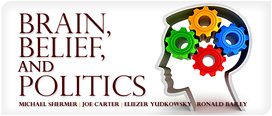Lead Essay
Michael Shermer discusses scientific findings about belief formation. Beliefs, including political beliefs, are usually the result of automatic or intuitive moral judgments, not rational calculations. One cluster of those intuitions presumes that human nature is malleable; these usually produce a liberal politics. Another group of intuitions presumes that human nature is static; these tend to produce conservatism. But Shermer argues that humans really fall somewhere in between — malleable, within some important limits. He argues that this set of findings should produce a libertarian politics.
Response Essays
Eliezer Yudkowsky suggests that the partial mutability of human traits is an auxiliary reason at best for Michael Shermer’s libertarianism. Take that fact away, and Shermer’s politics probably wouldn’t go with it. Yudkowsky says that his own small-l libertarian tendencies come from the long history of government incompetence, indifference, and outright malevolence. These, and not brain science, are the best reasons for libertarians to believe what they do.
Moreover, we make a logical error when we infer shares of causality from shares of observed variance; the relationship between nature and nurture is cooperative, not zero-sum. One thing, however, is clear: Human genetic variance is tiny, as indeed it must be for human beings all to constitute a single species. Environmental manipulation can only achieve so much in part because of this universal human inheritance.
Joe Carter invokes an argument by philosopher Alvin Plantinga: If purely naturalistic evolution created the human brain, then we should expect our brains to be tuned for survival, not for truth detection. Michael Shermer appears to agree, at least so far. But if this is the case, then we have no reason to consider the theory of purely naturalistic evolution, or for that matter any other set of propositions, to be true. Under this rubric, truths are at best possible; they can never be necessary. Indeed, the monkey mind can never know that it knows the truth.
Ronald Bailey argues that the freedom envisioned by classical liberals is congruent with science and democracy, and that the progress of all three together has enriched much of the world in the last two centuries. The enemies of this libertarian project hearken back to tendencies from mankind’s evolutionary history; for much of that history, experiment of any type could often be fatal, and therefore we find within us what may well be an evolved resistance to experiment. This resistance manifests politically as either conservatism, or a yearning for a purer, more primitive time, when noble savages walked the earth. It is a vice found on both left and right, Bailey argues, and one for which the antidote is libertarianism.
Related at Cato
- Video: Michael Shermer discusses evolution and capitalism.
- Video: Timothy Ferris discusses his book The Science of Liberty: Democracy, Reason, and the Laws of Nature
- Cato Policy Report: “Capitalism and Human Nature” by Will Wilkinson

